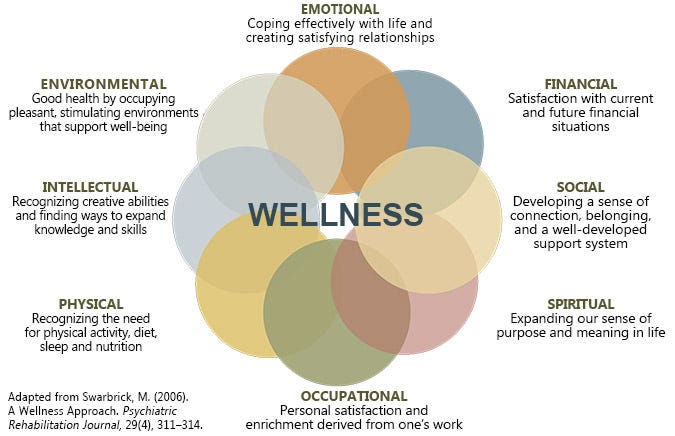Beyond Wellness
Aging Well Takes More Than They Say
I spend a lot of time thinking about aging and how to do it well. My focus has primarily been on the eight dimensions of wellness.
At age 86, I can still walk three to four miles on flat ground, play on the floor with my great-granddaughter, and keep myself going. So far, so good. However, I want to thrive more than just survive this getting older business.
Over the last few months, it’s been apparent that my strategy was missing a few essentials, such as life satisfaction, a sense of meaning, and the ability to manage stress. Maybe I’d conquered wellness but not well-being.
I wrote an article about well-being about a year ago but promptly put it aside. However, recent events suggest that I revisit the topic.
Experts explain the two terms in many ways. I prefer to think about them like this.
Wellness describes a healthy lifestyle beyond acute illness. It refers to a state of physical health in which people have the ability and energy to do what they want without chronic suffering.
Well-being refers to how people feel about themselves and their lives.
While wellness is essential to overall well-being, it’s only part of a thriving life. Consider the person who eats healthy foods and exercises regularly but has few friends and little money. Not only do they struggle, but chronic health issues may occur.
Well-being seems more relevant than ever, as modern lifestyles demand a holistic approach to health and self-care.
I’ve tried numerous ways to care for myself, such as journaling, cuddling with the cats, learning new skills, and exploring hobbies. They work—to a degree. I also discovered some I “should” adopt, like learning to say no, exercising more, and setting boundaries. However, those didn’t inspire the life satisfaction I was seeking.
I recently realized that caring for oneself means different things to different people. Understanding what it means to me and my well-being took time. I’m working to improve my self-care plan in two ways right now.
Changing My Environment
The first thing I did in the morning was turn on the news. Recently, I stopped and now turn to YouTube videos and Tim Janis's music. The music is soothing, and the scenery is incredible—birds, butterflies, flowers, waterfalls, and animals—nature in all its glory. A side benefit is that I’m better focused.
I bought an electric blanket, which the cats and I love. I’ve pulled up the window blinds in all the rooms to let in more daylight and sunshine, and electric candles brighten the long evenings. The apartment has a fireplace I use more often, and a vase of fresh flowers sits on the counter. Being by the water calms me—even watching a video, walking by the fountain outside my patio, or looking at the tabletop fountain I just bought. It’s better, but I’m still looking for additional options.
Connecting
I’m also reestablishing my social life, which fell apart during eight years of caretaking, the pandemic, and figuring out how to be a single woman after 60 years of marriage. I consciously try to connect with people in person and online and accept invitations to do things. However, being somewhat of an introvert and not driving presents challenges.
That’s just the beginning; further adjustments are being considered. Stay tuned.
So far, I'm finding the following true for people wishing to experience well-being.
Aging well requires wellness and well-being.
Self-care requires knowing what meets my needs, not what “they” say.
My solutions may differ from theirs. I, like them, must know what’s right for me.
If you think about it from that perspective, how do you care for yourself?
I’d love it if you could share the Aging Well newsletter with others. I want to share the lessons I’ve learned through my years of life and caregiving with as many people as possible. More than anything, I want to continue expanding our community of readers.
So please forward this email to a friend and invite them to join us. They can subscribe here:
Thank you so much for being part of the Aging Well community.
If you want to contribute to my work, consider donating to the Alzheimer's Association. This link takes you to their website. The choice is yours.
Janice Walton is a psychologist, widow, mother, grandmother, great-grandmother, and writer. Her book Aging Well: 30 Lessons for Making the Most of Your Later Years is available on Amazon, and she has written articles for Substack.




I want to thrive more than just survive this getting older business.
Thrive more than survive. Yes to this and making self care in all its dimensions a priority. From your 87 yr old friend who knows a thing or two.